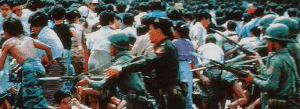
Campus cool on anti-war action
STANFORD, CA - Although members of Congress from both major political parties have begun to call for the withdrawal of troops from Iraq, anti-war demonstrations, which were common at Stanford University in 2003, have yet to be seen on campus this year, according to the Stanford Daily.
Senior Tanya Haj-Hassan, president of the Coalition for Justice in the
"Many who had initially taken an anti-war stance and who are still against the war fear that withdrawing the troops at this point in time may increase the instability that the war created and only worsen the situation," she said.
At least 30 Stanford students were arrested during protests in March 2003. Less than 12 hours after President George W. Bush announced the first strikes against
Haj-Hassen argued that "people are still very interested in what is going on in the region," but are expressing their concern and discontent "through different means."
Junior Omar Shakir, president of the Muslim Student Awareness Network, agreed. "I think that student activism regarding
He drew a distinction between present student activity and past protests. "Our group usually does not organize rallies or protests because we have found that students on campus are generally not receptive to that kind of approach," he said. "Awareness and advocacy are critical and ultimately more effective at Stanford."


